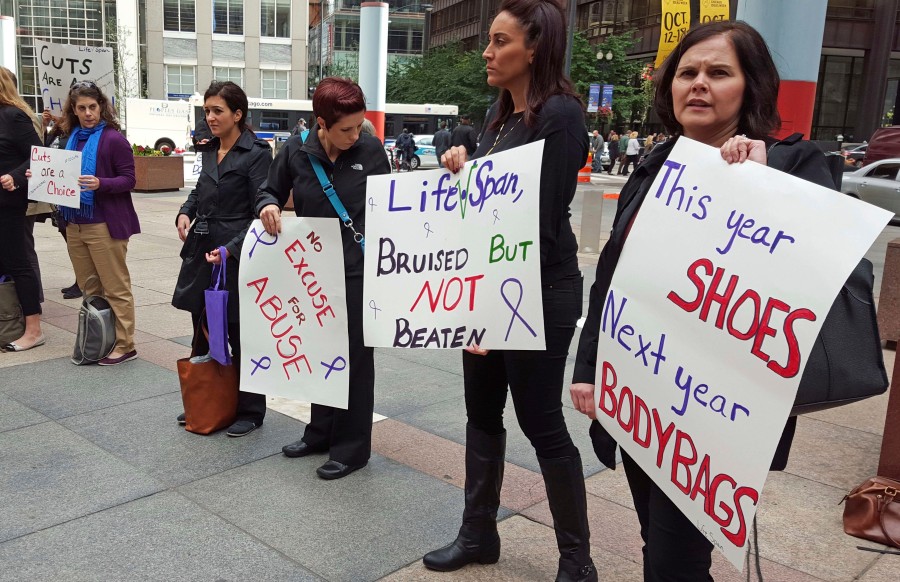Abrupt Cuts Hinder Illinois Violence Shelters
By John O' Connor

Abrupt Cuts Hinder Illinois Violence Shelters
By John O' ConnorSPRINGFIELD, Ill. (AP) — Illinois officials waited more than five months to alert dozens of domestic violence programs that their funding had been eliminated, an omission that has forced layoffs and other cuts at some facilities, according to interviews and documents reviewed by The Associated Press.
No one knows — or is saying — why approximately $9 million in state funding for 62 programs that provide shelter, counseling and advocacy for victims of domestic abuse was left out of a six-month budget that took effect July 1. When providers finally learned they were left empty-handed, they scrambled to make up the lost money by slashing jobs and salaries and expanding client waiting lists.
Although there is no indication officials intended to slice funding for the domestic violence programs, the money won’t easily be restored in the state’s precarious economic situation. Illinois has operated without a spending plan since July 2015 because of bickering between first-term Republican Gov. Bruce Rauner and Democrats who control the Legislature.
Rauner will deliver a budget address Wednesday to the General Assembly.
Michelle Meyer, executive director of Kane County-based Mutual Ground, a 24-hour shelter and counseling center, laid off four people in November after months of not receiving checks — or answers — from the state. They include a case manager and a sexual assault counselor. That’s not counting the six who have left in the last year which Mutual Ground can’t afford to replace.
“We have no more case managers, who help clients get benefits, housing, child care, accompany them to court,” Meyer said. “There’s nobody to pick up that work. Everybody that we can’t help is put on a waiting list.”
It wasn’t until Dec. 16 — just two weeks before the temporary budget expired — that Human Services Secretary James Dimas sent a letter to all providers alerting them to the exclusion.
The program was fully funded in 2015-2016, at $18.6 million, money that was tapped out by late summer. In his letter, Dimas acknowledged “some confusion” about funding in the latest spending plan and promised that it would be fully paid when available.
Dimas offered no explanation for delayed announcement, and spokeswoman Meghan Powers declined to answer AP questions about the late notice.
Experienced state vendors know they sign state contracts that make payment dependent on legislative approval. But domestic violence program providers say they submitted budgets to DHS for review and, in some cases, had to amend them before getting DHS contract approval last spring. Without notice that there wasn’t money forthcoming, “They’ve already spent that money and they’re struggling,” said Vickie Smith, executive director of the Illinois Coalition Against Domestic Violence.
Of the 62 domestic violence sites that receive state funding, 39 also receive federal money because they provide 24-hour shelters, Smith said. That amounts to about two months’ worth of operations.
Some agencies are zealously fundraising, although Gretchen Vapnar, executive director of Community Crisis Center in Elgin, lamented, “Most of our donors have already paid their taxes.”
At the Center for Domestic Peace in Chicago, which provides counseling to offenders, program manager Mike Feinerman said the agency’s highest-paid employees agreed to take a 5 to 10 percent cut in salary after receiving the DHS news.
Rep. Greg Harris of Chicago, a Democratic budget negotiator, saw his House-approved January plan to provide emergency funding of $6.6 million die in the Senate. The state lacks a “consistent message” to vendors and their financial support, he said.
“They had contracts to do the work and were instructed to proceed and had the rug pulled out from under them,” Harris said.
Smith said she wasn’t aware late on June 30 when the temporary budget was approved, hours before it was to take effect, that the 800-page document had no domestic violence support.
“I don’t care how it came down,” she said. “We need to fix it.”